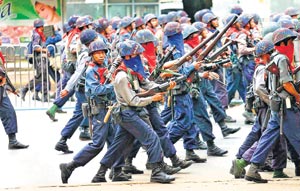
Why world body is incapable of dealing with MyanmarNEW YORK - As more than 140 world leaders descended on the security-conscious, heavily-barricaded United Nations last week, the focus of the international community dramatically shifted to the protests, violence and the brutal crackdown of demonstrators, including Buddhist priests, in Myanmar (formerly Burma). But the most powerful body at the UN, the 15-member Security Council, remained politically paralyzed because it failed even to issue a presidential statement condemning the unfolding events in a country ruled by an illegitimate military junta. A presidential statement, one of the mildest forms of condemnations by the Security Council, can be issued only if all 15 members agree. But China, one of Myanmar's closest political, economic and military allies, refused to endorse the statement. As a result, the United States and the European Union, the aggressive champions of human rights and multi-party democracy worldwide, were left utterly helpless and impotent.
The political reality was obvious: they were being given a dose of their own bitter medicine because every time the Non-Aligned Movement (NAM) or the Organisation of Islamic Conference (OIC) initiates a presidential statement or sponsor a draft resolution condemning the atrocities committed by Israel against Palestinians, the opposition to such moves has come either from the US or the European Union, or both. So, what goes around, comes around. During the last few months, Israeli forces have continued with their military raids on Gaza, presumably to retaliate against rocket fires. But in the process, several civilians, including women and children, have been caught in the cross fire and killed. Last week alone, the death toll in the Gaza Strip reached 12, with some 21 Palestinians wounded. But neither the US nor the European Union ever contemplated issuing a Security Council presidential statement condemning the continued repression in Israeli-occupied territories or initiated a resolution against Israel. Although there is no justification for China's ambivalence on the brutal repression in Myanmar, it is obviously protecting its own interests in Burma. And in doing so, it is following in the political footsteps of the US and the EU, who have their own hidden agendas either in supporting Israel or condemning Iran. The Chinese may well say: You protect and shield your allies. We protect ours. That's also the hard and fast principle in international diplomacy. The tragedy of it is that such a principle -- espoused by all the world's major powers -- makes a mockery of international diplomacy and the United Nations itself. After a closed-door meeting of the Security Council last week, the Chinese Ambassador Wang Guangya dished out the traditional party line: the conflict in Myanmar was a domestic issue and had to be settled by the people of Myanmar, not by the world body. Since the Security Council is primarily involved only with threats to international peace and security as spelled out in the UN charter, he told reporters: "The situation in Myanmar has some problems, but does not constitute a threat to international and regional peace." India, another arms supplier to Myanmar with close economic ties to the military regime there, also takes the position that whatever happens in that country is essentially a domestic issue and does not warrant international intervention. Last January, both China and Russia, two veto-wielding permanent members of the Security Council, used their clout to veto a U.S.-sponsored draft resolution urging the government to release all political prisoners and speed up the transition to multi party democracy. The double veto was one of those rare events in the history of the Security Council. But it reflected the strong political support for the military regime in Myanmar by two major powers in the world body. Ambassador Vitaly Churkin, the Permanent Representative of Russia to the United Nations, told reporters last January: "The Russian Federation did not believe the situation in Myanmar posed a threat to international peace and security." But he conceded that if there are "certain matters, including human rights", that need to be addressed, they should be done "in the proper fora"-- not the Security Council. The 117-member Non-Aligned Movement (NAM), the largest single political bloc at the United Nations, has taken an equally strong stand against any Security Council action on Myanmar. "The Non-Aligned Movement does not consider that the situation in Myanmar constitutes a threat to international peace and security, and opposes attempts by a permanent member of the Council to categorize Myanmar as such," a NAM statement said last January. "Therefore, it is the position of the Movement that the situation in Myanmar should not be on the agenda of the Security Council." Whether NAM will change its position as result of last week's demonstrations and shootings is left to be seen.
Meanwhile, Secretary-General Ban Ki-moon has asked the Burmese junta to also show compassion to the country's longest serving political prisoner: Daw Aung San Suu Kyi. But to no avail.The former Nobel Peace prize recipient, who remains under house arrest, led the National League for Democracy which, in 1990, won 82 percent of the legislative seats in Burma's national elections, subsequently annulled by the military junta. |
|| Front
Page | News | Editorial | Columns | Sports | Plus | Financial
Times | International | Mirror | TV
Times | Funday
Times || |
| |
Reproduction of articles permitted when used without any alterations to contents and the source. |
© Copyright
2007 Wijeya
Newspapers Ltd.Colombo. Sri Lanka. All Rights Reserved. |
